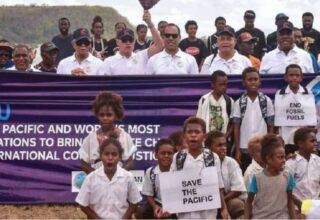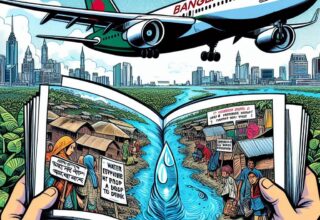(Originally published here)
The next head of the U.N. process to tackle climate change should come from one of the world’s poorest countries, which led an ambitious drive to limit global warming to 1.5 degrees Celsius in the new Paris deal, a leading expert has proposed.
With Christiana Figueres stepping down as executive secretary of the U.N. climate change convention in July, “it’s time for the least developed countries to have a chance at that particular slot”, said Saleemul Huq, director of the Dhaka-based International Centre for Climate Change and Development.
He suggested Pa Ousman Jarju, Gambia’s environment minister, or Youba Sokono, a Malian scientist and former coordinator of the African Climate Policy Centre, as possible candidates.
Turning the new agreement to curb climate change, negotiated at a December summit in France, into genuine action will be a tough and risky process, experts told a discussion in London on Monday.
It is also potentially complicated by the resignations this year of some key figures, including Figueres, Hela Cheikhrouhou of the fledgling Green Climate Fund, and Laurent Fabius, France’s former foreign minister who shepherded the Paris agreement to completion, they added.
But developing nations – some of whom have become role models in cutting their planet-warming emissions and adapting to climate impacts – could play a growing role, said Huq and Achala Abeysinghe, a legal adviser on climate issues for the least developed countries and a governance expert with the London-based International Institute for Environment and Development.
RACE TO THE BOTTOM?
Perhaps the biggest challenge facing the new deal is whether a “bottom-up” plan – built around each country’s pledges to reduce their emissions and help poorer countries adjust to climate shifts – will add up to enough emissions cuts, Abeysinghe said.
“Will countries actually race to the top, or will they race to the bottom?” she asked. “If they race to the bottom, we are in big trouble.”
And finding a way of pushing countries to ever-more ambitious commitments without making penalties for failure so tough politicians refuse to ratify the climate agreement will be a difficult balancing act, she said.
“If you go too punitive, there’s a risk countries will put forward the lowest common denominator because they don’t want to be sanctioned,” she said.
For the new climate deal to come into effect in 2020, as planned, 55 countries representing 55 percent of global emissions must first ratify it. If that happens early, the deal could be legally put in place prior to 2020, Abeysinghe said.
At the Paris summit, the least developed countries teamed up with the African group of nations and small island states to win agreement on a long-term “aspirational” goal of holding climate change to 1.5 degrees Celsius above pre-industrial levels, below the 2 degree limit previously sought.
Poorer nations also helped lead a successful push for a permanent “international mechanism” to deal with losses and damage from climate change that are too severe for people to overcome, such as island states becoming uninhabitable due to sea-level rise, Huq said.
A U.N. panel looking at innovative finance to tackle climate change has made “loss and damage” its focus this year, he said.
As losses from more extreme weather and higher seas worsen, the annual U.N. climate change conference – called “COP” for short – in Morocco in November could make the subject a key focus, he predicted.
“Marrakech will be the loss and damage COP,” Huq said.
Finding sufficient financial support to drive an energy transition away from fossil fuels and help more vulnerable countries adapt to climate impacts will also be key, he said.
The money does not need to move through the international Green Climate Fund, which has had a slow start, he added. Getting the fund going “is going to take years, especially to fund adaptation at scale”, Huq said.
In the meantime, donors should consider giving cash to existing climate change funds, including one earmarked for the least developed countries, he said.
The vast majority of climate finance today goes to efforts to reduce emissions rather than for adaptation, Abeysinghe said. That imbalance makes some sense as the need to curb climate change is urgent, and can lead to lower adaptation costs in the long run, she noted.
But “the least developed countries will need more money for adaptation finance going forward”, she added.
Written by: Laurie Goering, Thomson Reuters Foundation









